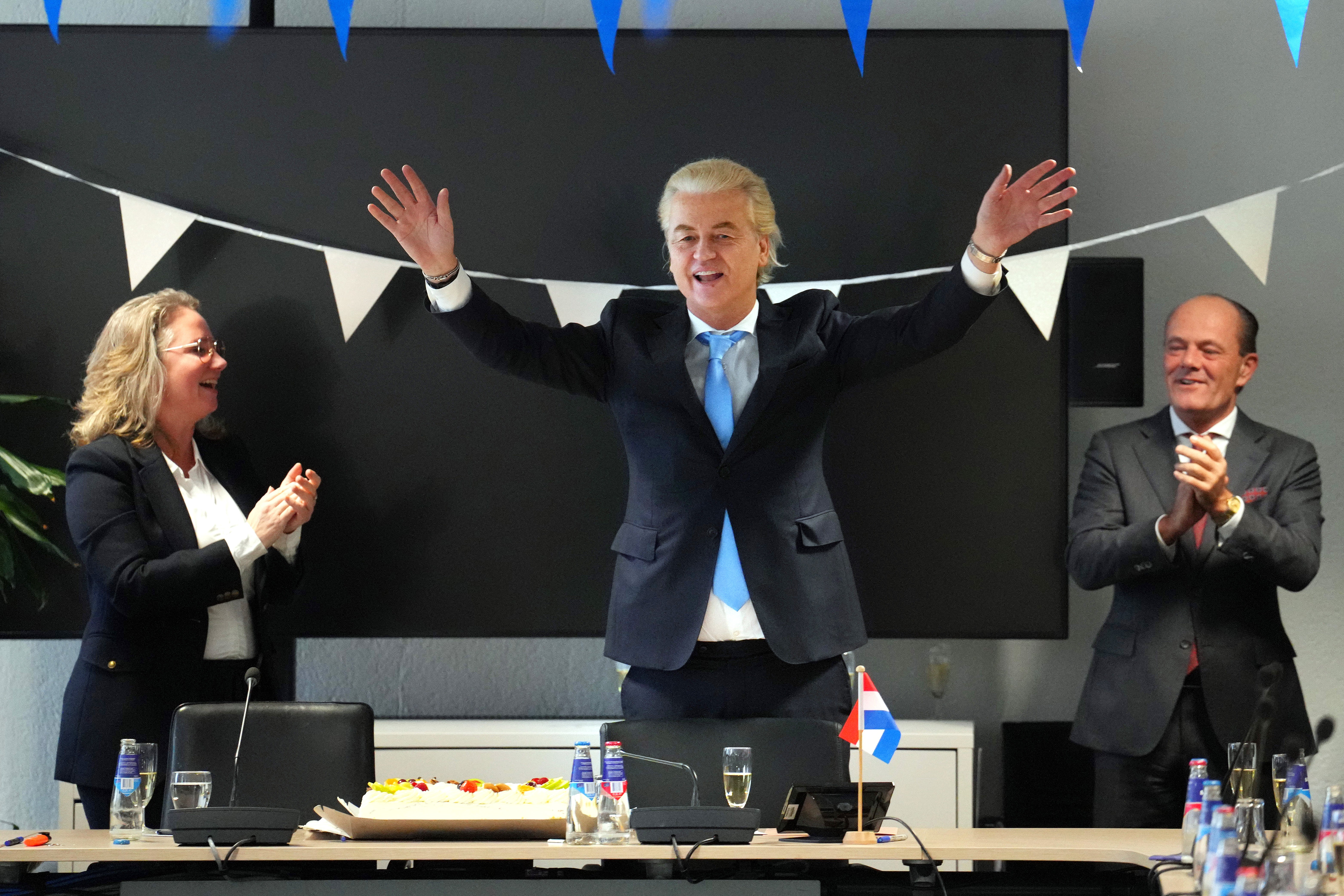Can the far-right Geert Wilders actually form a government after his shock Dutch election win?
The leader of the Party for Freedom – known for his extreme anti-Islam rhetoric – is in pole position to try and become prime minister in the Netherlands, writes Chris Stevenson


For years Geert Wilders was in the political wilderness, his anti-Islam views – often expressed in the most inflammatory language – making him an outlier, even as his Party for Freedom (PVV) has consistently held seats in the Dutch parliament. Wilders himself has been in parliament since 1998, even before he founded PVV. An outcast entrenched in the establishment.
That founding came about as Wilders’ increasingly hardline views caused him to split from his previous political home, the People’s Party for Freedom and Democracy (VVD), sitting as a one-man faction, Wilders Group, before forming the PVV in 2006. Over the next 17 years, Wilders’ fortunes would be defined by his statements on Islam. He has been banned – for part of 2009 – from entering the UK, he has a conviction for insulting Moroccans from 2016, and has faced countless death threats. This has led to almost two decades of requiring personal security that caused him to once suggest he could no longer imagine what it was like to walk down a street by himself.
The closest he had come to power before this week was in 2010. His party supported the first coalition formed by then-prime minister Mark Rutte in 2010. But Wilders did not formally join the minority administration and brought it down after just 18 months in office in a dispute over austerity measures.
Now, the far-right leader is in pole position to try and form his own coalition and become prime minister, with the party forecast to win 37 seats in the 150-seat lower house of parliament, more than double the 17 the party secured in the last election. A majority requires 76.
“The PVV can no longer be ignored,” he said. “We will govern.”

Wilders’ task will not be a simple one. While he has toned down some of his inflammatory rhetoric during the election campaign, manifesto proposals include banning the Quran and mosques and closing Islamic schools, as well as a ban on Islamic headscarves in public buildings. It is proposals such as these that have caused several parties to rule out working with him. Wilders has said he is willing to put those proposals “in the freezer”.
Wilders also wants strict limits on immigration; a complete halt to all grants of asylum in the Netherlands. Those are plans that would likely have to be toned down in any coalition talks, as well as his desire to “push back” asylum seekers attempting to enter the Netherlands from EU neighbours.
The left-wing alliance headed up by the former EU commissioner Frans Timmermans came second in the election with 25 seats. Timmermans has rejected any part in a Wilders-led government saying “everyone” in the Netherlands “is equal”.
Wilders is staunchly anti-EU and has repeatedly hit out at “the political elite in The Hague and Brussels” and made clear in his support for “Nexit” – the Netherlands following the UK out of the union. Wilders knows that polls show that most Dutch voters don’t want to leave the EU, but he is sure to keep pushing in some form. However, he is unlikely to get any coalition partners to sign up.
Wilders will also likely have to compromise on long-standing calls to withdraw military support for Ukraine and slash spending on climate goals. Among his party’s campaign vows was to move the Dutch embassy in Israel to Jerusalem and immediately close its diplomatic office in the “corrupt” Palestinian Authority. That is another area that is particularly sensitive right now.

Wilders told Dutch media on Thursday he wanted to be prime minister and that he was still in favour of a referendum on whether the Netherlands should leave the EU, “But the first thing is a significant restriction on asylum and immigration,” Wilders said. “We don’t do that for ourselves, we do that for all Dutch people who voted for us.”
In his victory speech, Wilders said he wants to end what he called the “asylum tsunami” referring to the migration issue that came to dominate his campaign. “The Dutch will be No 1 again,” he said. “The people must get their nation back.”
So who would be possible coalition partners? A coalition of the Freedom Party, VVD – which finished third in the election with 24 seats – and the NSC party of the centrist Pieter Omtzigt would have 81 seats combined, making it the most obvious deal. Coalition talks are expected to take months after they begin on Friday, as both VVD and NSC leaders have expressed reservations about working with Wilders.
Dilan Yesilgoz, Rutte’s replacement as the head of the VVD party, said on the evening before the election that she would not serve in any cabinet with Wilders as prime minister, though she did not exclude her party’s participation. Omtzigt said he could not compromise with Wilders on ideas that would violate the Dutch constitution – most notably the words in the first article which forbid discrimination. “I know that as a middle party, as a party with ideals, we need to look at which way this country is governed,” Omtzigt said.
Wilders has claimed he would be prime minister for everyone “regardless of their religion, background, sex or whatever”. It is up to the other Dutch political parties to figure out how much they believe him, given all that has gone before.






Join our commenting forum
Join thought-provoking conversations, follow other Independent readers and see their replies
Comments